Reflection on Eaquals International Conference, 2019 by Özlem Baykan, Selen Şirin Dülger and Serkan Aras
Özlem Baykan’s Reflection on the Conference
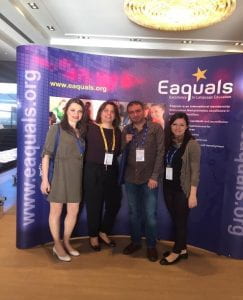
I had the opportunity to attend and give a presentation at EAQUALS International Conference, 2019 which was held in Madrid, Spain this year. The conference focused on 5 different themes: Language Teaching and Learning, Course Design, CEFR and Assessment, Leadership and Management, Staff Development, and Business and Marketing Management. It was a 3-day conference where one day was allocated for Management Training and the other days were allocated for plenaries and sessions on different areas.
On Thursday, 11 April, the conference started with Management Training given by Maureen McGarvey who is Programme Manager eLearning at IH London. The training gave us the opportunity to consider and reflect on our own organization and culture, and which management style is the most appropriate for it. Ms McGarvey also gave us detailed information about a survey carried out in her institution about what academic staff want and expect from their line managers. This information was very valuable because it was nice to see that the questions in the survey were very similar to the ones given at our own institution last year, and some of the expectations were also similar like flexible professional development, not just box-ticking, effective monitoring, support and praise, similar expected systems for performance management, and support in resolving issues. There were also some other different expectations raised, though. For instance, the academic staff wanted to have more observations with a specific focus, more frequent catch-ups, more contact and regular brief conversations. Seeing a similar survey done in another institution gave me the opportunity to make a comparison between two different institutions and see how performance management is perceived in each (and how this perception is similar in many respects). The training then went on with analysing some case studies and drawing up some important points for performance management.
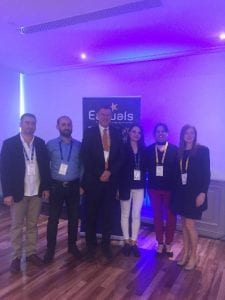
The second day of the conference, Friday 12, started with the conference opening and the presentation of award winners. It was very nice to see that the winner of the Eaquals Teacher Award and two Scholarship awards were given to people from our institution, Selçuk Bilgin, Serkan Aras and myself. I was happy to win the Scholarship award because it gave me the opportunity to meet people from the Eaquals board and give support during the conference through chairing some sessions and taking part in meeting and welcoming new accredited members.

On the same day, I also gave my own presentation entitled ‘Towards a more effective performance management to increase quality’. My presentation basically focused on the existing performance management practices in our school, the evaluation process we have gone through in the previous academic year to increase effectiveness, the actions we have taken based on the questionnaire and focus group meeting results, and how we are going to proceed to ensure ongoing effectiveness and quality with the new tools and practices we have. The abstract and the presentation can be found on Eaquals website for those who are interested.
On both Friday and Saturday, I had the chance to attend very thought-provoking plenaries and sessions, and to chair many nice sessions. Highlights from some of them can be found below:
Plenary – ‘Unpacking Management and Leadership’ by Martin Fellenz

This plenary talk focused on the nature of management and leadership, how management should be, the distinction between management and leadership. While focusing on these areas, Mr Fellenz gave good insight into traditional views of management and leadership vs undiscerning views by giving suggestions about developing more successful and effective leadership and management practices. As a Team Leader, this talk gave me a lot of ideas about how to do things more effectively, so I benefited a lot from it.
‘Outlining competencies and professional development for language teaching manager’ by George Pickering
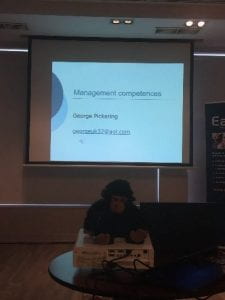
This was one of the sessions that I enjoyed the most and found the most useful. The session focused on a set of management competencies and CPD framework for managers. As defining management competencies is the second step we need to take in our school as part of increasing effectiveness in performance management, I found this session quite relevant to our institution, and it gave a lot of insight into how to do this through the explanations and samples given by Mr Pickering.
‘Learning focused interventions’ by Silvana Richardson
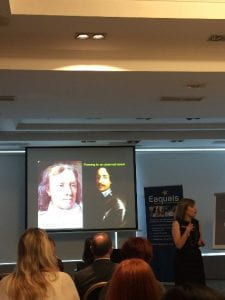
This was a very interesting and thought-provoking session I attended and chaired. It focused on the effect of teaching on learning and what has been done to analyse this and what they have changed to make it more effective. The most interesting part of it was the ‘minimalist lesson plan’ and ‘learning-focused observations’ they have recently put into practice. Different from common lesson plans, this plan required all information from learners’ point of view, which I thought would be worth trying and implementing. Those who are interested can take one sample copy of this plan from me.
‘Creating dialogue, not debate: The power of advocacy and inquiry’ by Martin Fellenz
This session focused on creating an effective dialogue in group interactions and group decision-making settings, and the role of advocacy and inquiry in such settings. Since our job also requires group interactions most of the time, the two approaches and how they can be applied in group interactions helped me to have a different perspective on this area and to see how I can relate it to our own setting, especially team meetings to have more effective and constructive collaboration and dialogue.
There were also many other sessions I attended, but I won’t go into further detail at this point not to make things longer but I can say that management & leadership and professional development were the areas that I was most interested in, so attended sessions mostly on these themes. I also found the chance to meet many people from different institutions, catch up with what is going on in general, had nice chats with many people during the social events. Therefore, it was a very nice experience for me with such a quality conference full of fruitful experience.
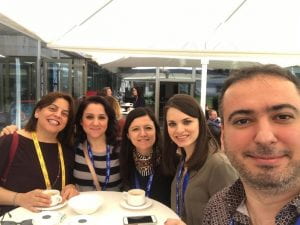
Selen Şirin Dülger’s Reflection on the Conference
I had the opportunity to attend and present at the EAQUALS Annual International Conference 2019 that took place in Madrid, Spain. The conference focused on five themes: Language Teaching and Learning; Course Design, CEFR and Assessment; Leadership and Management; Staff Development and Business and Marketing.
Management Training Workshop
The first day was planned as the management day and we had the chance to attend a management-training workshop given by Maureen McGarvey, program manager at IH London. The workshop started with the participants reflecting on their own organizations’ structure and culture. Maureen went over different types of organizational structures and cultures and made us reflect on our own in the light of the ones she presented. Discussing some research on what academic staff expect from their managers, we tried to come up with a list of things to do / not to do for performance management in our own institutions.
The following are some of the quotes from the workshop that I found interesting and noted down:
‘You cannot learn a work culture from a diagram. You have to live it.’
‘You have to work for CPD, but you should be aware of the changing needs of the century. You have to know what it means to be teach / be a teacher in your specific context so that you can plan an effective CPD program.’
‘It is important to recognize / appreciate teachers when they are good.’
During this workshop, it was nice to see that we as the school are on the right track in terms of management.
Friday started with the conference opening speech by Justin Quinn, EAQUALS chair, which was followed with the presentation of EAQUALS Teacher Award, 2019 and announcement of Scholarship Award Scheme Winners, 2019. This was a nice moment since there were 3 people from ScOLa at the stage. Once again, I would like to congratulate our colleague, Selçuk Bilgin on receiving the teacher award and our colleagues, Özlem Baykan and Serkan Aras on winning the scholarship this year.
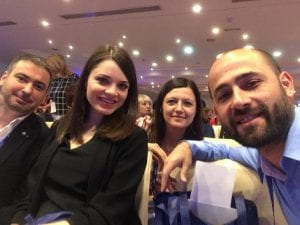
At this conference, I particularly attended the sessions on the theme of staff development and below, you can find my reflection on and my notes from some of the sessions I attended on Friday and Saturday.
‘Outlining competencies and professional development for language teaching manager’ by George Pickering
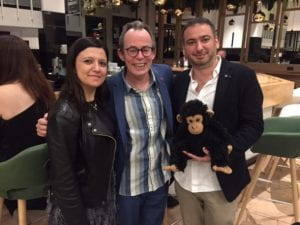
His talk was mainly about management competencies as the title suggests. Upon defining core, common and job-specific competences, he talked about advantages of management competences, what can go wrong about competences and possible future management competence categories. I really enjoyed George Pickering’s session and I felt happy to finally listen to him after hearing a lot about him for years. He was also very inspiring to me in the sense that he successfully incorporated humor into his session and I really did not understand how time flew in his session.
Session Title: ‘Use it or Lose it: how to activate professional knowledge’ by Kirsten Holt
Kirsten’s session was very thought provoking and made us reflect on what we have done about the teacher development sessions we have attended so far. In her session she stated ‘if we don’t do anything with the information we learn at the events, then within a month nearly 90% is redundant.’ Encouraging us to relate to our own teaching experiences and the developmental activities we attend, she listed several ways, which we can make use of to record and activate knowledge we acquire in any teacher development activities. She suggested using the below digital tool in order to record our knowledge, research, findings etc.:
‘MyCPD’: Free to English Teaching professional and Modern English Teacher subscribers; MyCPD is an intuitive, easy to use digital tracking tool for your continuing professional development reading, research and reflection. For more details, you can visit the following website:
https://www.etprofessional.com/mycpd
‘Routes into teacher training’ by Maria Heron and Thom Kiddle

Maria and Thom’s session focused on several paths into teacher training. They first outlined what it requires to become a CELTA trainer, which was followed with a focus on the new Professional Award for Teacher Educators. They also talked about online tutor-led interactive courses and face-to-face professional development courses in teacher training.
As I mentioned earlier in my reflection, I had the chance to present at this conference this year and my presentation was about the peer observation project we implemented with five instructors in the prep program. The presentation is entitled ‘Peer observation as a collaborative teacher development tool’ and in the presentation I mainly talked about what we did, why we did it, how we did it and how we felt being involved in peer observation project and whether we benefitted from it or not. It was a very exciting experience for me and the positive reactions I received after my presentation were very encouraging and motivating.
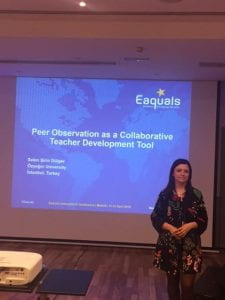
Overall, I feel that the conference has been a great opportunity for me to meet different people in different positions from different institutions and to discuss issues we face in our institutions, practices/projects we have been involved in, and ideas with these people face-to-face.
PS: those of you who are interested in the plenary speeches and presentations given at this conference can access all the sessions which are available on the conference website.
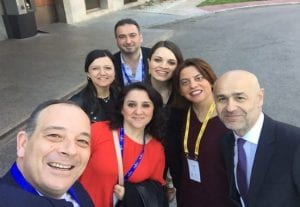
Serkan Aras’s Reflection on the Conference
In addition to the sessions Özlem and Selen explained, I would like to share my reflection on the two plenary talks.
Unpacking Management and Leadership by Martin Fellenz
The plenary by Fellenz made me question my definitions of management and leadership. What Martin Fellenz made the audience aware is that when people are asked to define what management or leadership is, people tend to explain their views of an ideal leader or manager. People do not define what management or leadership is in real life. Starting his presentation with this point, Fellenz helped us define the real nature of management and leadership. He claimed that a person does not need any qualities to be a manager and being appointed as a manager is enough to be a manager. However, Fellenz put forward that a leader is not appointed and what makes a person a leader is the followers this person has. Hence, whereas management refers to an authority-based legitimation, leadership is built on follower-based legitimation. So, how can leaders have followers? Fellenz claimed that to achieve this aim, a leader must learn how to tap into the developmental objectives of his/her students, colleagues, himself/herself.
‘Developing 21st Century Skills in English Language Teaching: Thinking skills, values, and self-esteem’ by Dr. Herbert Puchta
The plenary by Puchta was relevant to us as teachers of young adults. Puchta explained why the new generation (teenagers) are different and how these differences affect their behaviors. He claimed that human brain changes a lot when a person becomes a teenager. The development of the limbic system in teenagers’ brain results in a phase in which a teenager can do dangerous things. At this time, the teenager also lacks maturity and ability to run “what if” simulations. Puchta also reminded that despite the fact that “adolescence is a time of great danger, and a time of great opportunity” (Giedd, 2015). In other words, our teenage students have actually a great potential that may help them learn. Puchta advised teachers to give more responsibility and credit to teenagers so that they can construct their self-esteem and critical thinking skills. Otherwise, because of the lack of self-esteem and critical thinking skills, teenagers can be rebellious and resistant.
Developing Effective Assessment for Learning by Gordon Stobart
Stobart presented the results an interesting study in which the teachers whose students have been successful in exams six years in a row are observed. The study shows that the teachers
• are not exam-driven.
• have a passion for their subjects.
• do not spoon-feed students.
• emphasize holistic understanding.
Stobart concluded his presentation saying that high expectations are the key to improve learning.

Leave a Reply